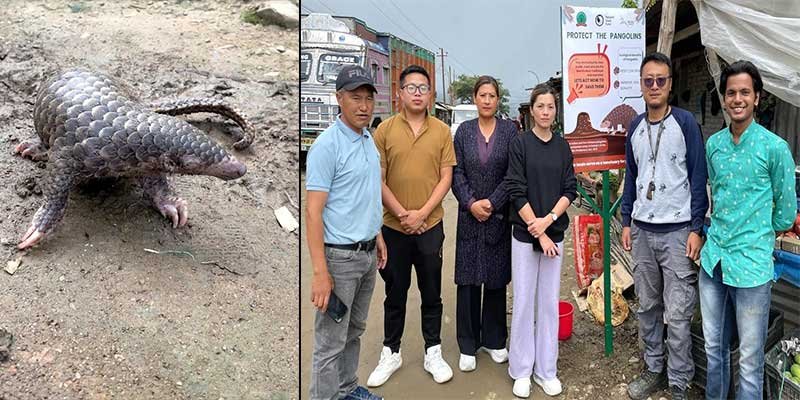Manipur: WTI’s awareness signages encourage locals to safeguard the endangered Pangolins

IMPHAL- In an effort to raise public awareness about pangolins and the urgent need for their conservation, the Wildlife Trust of India ( WTI ) supported by the Wildlife Conservation Network’s Pangolin Crisis Fund and in partnership with the Kamjong Forest Department has installed awareness signages in the local market.
Recently, a local farmer found a pangolin on his paddy field in the Kamjong district of Manipur. Recognising the species from the signages, he immediately alerted the Forest Department. Identified as a juvenile ‘Critically endangered’ Chinese pangolin, the animal was later released back into the wild.
Pangolins are the world’s most trafficked species in the world. India is home to the Indian pangolin and Chinese pangolin. Both species are listed under Schedule I of the Wildlife (Protection) Act, 1972 and included in Appendix I of CITES.
These shy, scaly mammals are targeted for consumption and traditional Chinese medicine which has led to a massive population decline in Asia. Despite efforts by wildlife authorities to combat the illegal trade, pangolin smuggling continues to thrive due to its lucrative nature.
The northeastern state of Manipur, inhabited by diverse ethnic groups with traditional practices that include hunting and consuming wildlife, ranks high in the illegal trade of pangolins and their derivatives.
Assam CM lauds Kaziranga frontline forest staff for saving stranded Rhino calf from flood waters
The presence of illegal wet markets where wildlife is openly sold, the porosity of international borders, and local economic factors create a favourable environment for illegal wildlife trade and other criminal activities.
Reports have confirmed that Manipur also serves as a temporary holding facility for exotic animals that are further traded within India or outside the country.
Worthem Hungyo, RFO, Kamjong said, “We thank the farmer for his compassion and for handing the pangolin over to us. Poaching of pangolins or the possession and illegal trade of their body parts is a criminal offence leading to imprisonment for between three to seven years. If you come across such incidents, please reach out to the forest department immediately. The pangolin has been released back into its natural habitat.”
Assam: Raimona National Park records first photograph of mainland Serow
Chingrisoror Rumthao, Field officer, WTI said, “We are happy to see the signages have a positive impact on the public. By educating the public and encouraging community involvement, this initiative seeks to foster a sense of responsibility and urgency in protecting pangolins.”
The team has also installed signages in Ava Market and Hamleikhong, en route to the Manipur Rifles Camp in Ukhrul, Manipur. As part of the Countering Pangolin Trafficking project by WTI, a successful ban on hunting pangolins was implemented at the community level across eight villages, namely Hunpun, Somdal, Chalou, Ngainga and Khuingai from Ukhrul district. Ngari Khullen, Ngari Khunou and Chatric from Senapati district.









